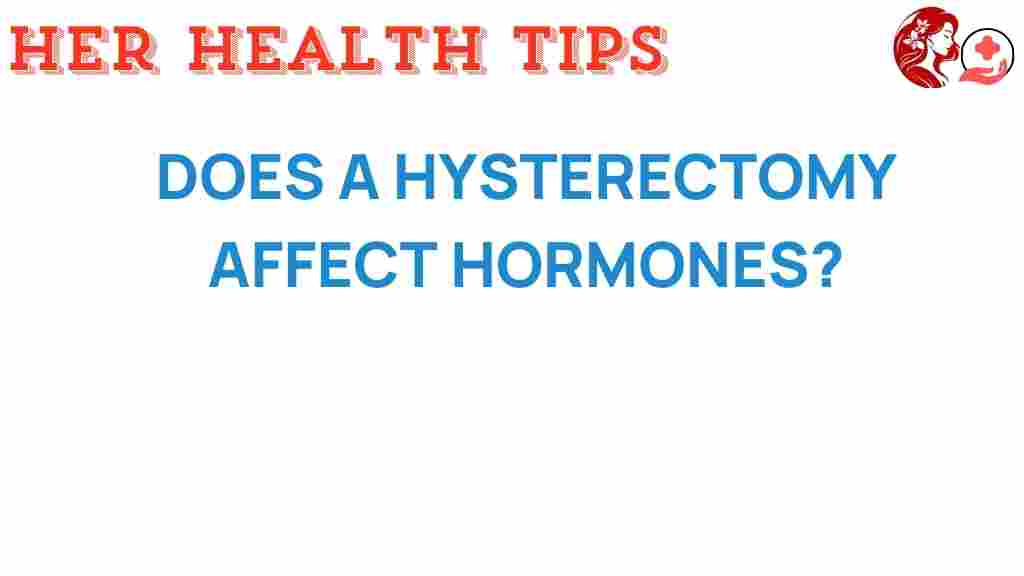Unraveling the Impact of Hysterectomy on Hormonal Balance
Hysterectomy is a surgical procedure that involves the removal of the uterus, and it is often considered for various medical reasons such as fibroids, endometriosis, or abnormal bleeding. This significant procedure can lead to various hormonal changes that significantly impact women’s health. Understanding the relationship between hysterectomy, hormones, and overall reproductive health is crucial for women who are contemplating or have undergone this procedure. In this article, we will explore the effects of hysterectomy on hormonal balance, including the role of estrogen and progesterone, and what women can expect in terms of post-operative effects.
The Role of Hormones in Women’s Health
Hormones are chemical messengers that play a vital role in regulating numerous bodily functions. In women, the primary hormones include:
- Estrogen: Responsible for the development of female secondary sexual characteristics and plays a key role in the menstrual cycle.
- Progesterone: Regulates the menstrual cycle and is crucial for maintaining pregnancy.
- Testosterone: Although often associated with men, women also produce testosterone, which contributes to libido and energy levels.
These hormones are produced by the ovaries and have a significant impact on various bodily functions, including mood, metabolism, and reproductive health. A hysterectomy can lead to a change in the levels of these hormones, particularly if the ovaries are also removed during the procedure.
Types of Hysterectomy
There are several types of hysterectomy procedures:
- Total Hysterectomy: Removal of the uterus and cervix.
- Partial Hysterectomy: Removal of the uterus while leaving the cervix intact.
- Radical Hysterectomy: Removal of the uterus, cervix, surrounding tissue, and sometimes part of the vagina.
- Hysterectomy with Oophorectomy: Removal of the uterus along with one or both ovaries.
The choice of procedure will influence the extent of hormonal changes experienced post-surgery, particularly if the ovaries are removed, which can lead to an abrupt decrease in hormone production.
Understanding Hormonal Changes After Hysterectomy
After a hysterectomy, particularly one involving the removal of the ovaries, women may experience significant hormonal changes:
- Estrogen Levels: With the removal of the ovaries, estrogen production can drop dramatically, leading to symptoms similar to those of menopause.
- Progesterone Levels: Progesterone levels will also decrease, which can affect menstrual cycle regulation and lead to other symptoms.
- Menopause: For women who undergo a hysterectomy with oophorectomy, surgical menopause occurs, leading to immediate cessation of menstruation and potential menopausal symptoms.
Symptoms of hormonal changes can include:
- Hot flashes
- Night sweats
- Vaginal dryness
- Mood swings
- Weight gain
Post-Operative Effects on Hormonal Balance
Understanding the potential post-operative effects of hysterectomy on hormonal balance is essential for managing women’s health effectively. These effects can vary based on the individual and the type of hysterectomy performed.
Immediate Post-Operative Effects
In the immediate aftermath of a hysterectomy, women may experience:
- Pain and discomfort at the surgical site
- Fatigue due to surgery and recovery
- Emotional changes, including anxiety and depression
These effects can be exacerbated by hormonal fluctuations, especially if the ovaries are removed.
Long-Term Hormonal Changes
In the long term, women may face:
- Increased risk of osteoporosis due to lower estrogen levels
- Cardiovascular issues linked to hormonal changes
- Changes in libido and sexual function
- Potential for weight gain and metabolic changes
Women should monitor their health closely and consult with healthcare providers for appropriate strategies to manage these changes.
Managing Hormonal Changes After Hysterectomy
Several strategies can help manage hormonal changes following a hysterectomy:
- Hormone Replacement Therapy (HRT): HRT can help alleviate symptoms of menopause and restore hormonal balance. This therapy can involve estrogen alone or a combination of estrogen and progesterone, depending on individual needs.
- Regular Exercise: Engaging in regular physical activity can help regulate hormones and improve mood and energy levels.
- Healthy Diet: A balanced diet rich in nutrients can support overall health and hormonal balance. Foods rich in phytoestrogens, such as soy products, may help mimic estrogen in the body.
- Mental Health Support: Seeking therapy or counseling can be beneficial for managing emotional changes and maintaining mental well-being.
Consulting with Healthcare Professionals
It is essential for women to have open discussions with their healthcare providers about the potential impacts of hysterectomy on their hormonal health. Questions to consider include:
- What type of hysterectomy is recommended and why?
- What changes in hormonal levels should I expect post-surgery?
- Are there options for hormone replacement therapy?
- What lifestyle changes can I implement to support my hormonal health?
By addressing these questions, women can better prepare for the changes that may come after their surgery and find effective ways to manage them.
Conclusion
Hysterectomy can have profound effects on hormonal balance, particularly when the ovaries are removed. Understanding the implications of this surgical procedure on hormones like estrogen and progesterone is essential for women’s health. By recognizing the potential post-operative effects and taking proactive steps to manage hormonal changes, women can navigate this transition more effectively.
For further reading on women’s reproductive health and hormonal balance, you can visit this resource. Additionally, discussing your concerns and options with a qualified healthcare provider can provide personalized guidance tailored to your health needs.
In summary, while a hysterectomy can be a necessary medical intervention, being informed about its impact on hormonal health can empower women to make the best choices for their well-being.
This article is in the category Reproductive and created by HerHealthTips Team
